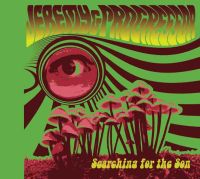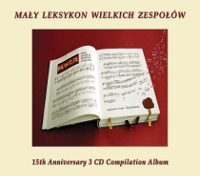 The last time that Jeremy Morris released an album with Progressor (Vitaly Menshikov) was back in 2005 when they joined forces for ‘The Pearl of Great Price’, so it has taken them a while to get back together, but given Jeremy’s recording output probably that isn’t too surprising. They both provide different instrumentation, while Jeremy provides the vocals, but there are also a few other musicians involved, notably John ‘Rabbit’ Bundrick. I was playing his superb ‘Moccasin Warrior II’ album just the other day, so it was interesting to find him on here. I was asked to provide a much more detailed review on this album, something that I very rarely undertake just due to the amount of music I listen to and the time I have to write about it, but given that Jeremy and I have known each other for some twenty years why not? In fact, I finally got all my cassettes out the other day, and still have ‘Green’, ‘Soul Saver’ and ‘Dreams Come True’ from all those years ago! One never knows quite what to expect from Jeremy in terms of what style will be in place on each release, but this is mostly songs with vocals, Christian lyrics, and a musical style that is reminiscent of the last Sixties.
The last time that Jeremy Morris released an album with Progressor (Vitaly Menshikov) was back in 2005 when they joined forces for ‘The Pearl of Great Price’, so it has taken them a while to get back together, but given Jeremy’s recording output probably that isn’t too surprising. They both provide different instrumentation, while Jeremy provides the vocals, but there are also a few other musicians involved, notably John ‘Rabbit’ Bundrick. I was playing his superb ‘Moccasin Warrior II’ album just the other day, so it was interesting to find him on here. I was asked to provide a much more detailed review on this album, something that I very rarely undertake just due to the amount of music I listen to and the time I have to write about it, but given that Jeremy and I have known each other for some twenty years why not? In fact, I finally got all my cassettes out the other day, and still have ‘Green’, ‘Soul Saver’ and ‘Dreams Come True’ from all those years ago! One never knows quite what to expect from Jeremy in terms of what style will be in place on each release, but this is mostly songs with vocals, Christian lyrics, and a musical style that is reminiscent of the last Sixties.
Searching for the Son (8:07) – Gentle bubbling keyboards lead way into a solid dose of psychedelic progressive pop, as the chords become more strident and the full band comes in. Dreamy, atmospheric and evocative, the addition of saxophone onto this track definitely gives it even more power and emphasis while the slightly strained guitar also brings back memories of a time gone by.
Future Flight (7:44) – Gently picked guitar, and delicate mellotron combine with some ‘spacey’ sounds to lead us into another number that could have come straight from the end of the Sixties. Picked guitar and a driving bass leads us through a number that swirls, shifts and changes throughout.
The Blind Man’s Dream (6:53) – Layered keyboards and gentle 12-string slowly introduces to some phased distorted guitar, as the guys gradually kick into one of the heaviest numbers on the album. There is a real edginess to this one, with plenty of guitar soloing, and although it is only seven minutes long it contains many distinct musical sections, with the repeated lyrics and themes returned to nearer the end. Throughout, the keyboards act as a bedrock for the guitars to do very much their own thing, with more than a hint of later-period Beatles.
Distant Light (10:28) – Lots of clarinet-style keyboards on this number gives it quite a different feel, as does the use of gently strummed acoustic guitar. But, as with others, this number has multiple sections, and when it starts to drive along there is a much greater impact due to the softness of what has gone before.
Wings of the Wind (11:16) – The longest song on the album, this also has multiple sections, and brings in loads of different musical elements trumpet combining with electric piano at one point, with distorted guitars all adding to a very jazzy feel. In fact, it seems quite chaotic at times, very different to the more structured and laid-back feel of much of the album. But what really makes this for me is the wonderfully delicate piano that comes in and out throughout the song, and closes it out as a solo. There is wonderful touch and emotion contained within those notes.
Messiah Will Come (7:09) – This starts as a far more orchestral piece with layers of synth strings, and some real trumpet, before it moves into a more psychedelic number led by some jangly guitar. Bill Morris’ trumpet is again an important factor in this song, before guitar and keyboards dominate with some wonderful interplay.
Had Enough (4:34) – This is one of three totally solo Jeremy songs on the album, and is the most poppy/psych of everything. A repeated chorus line gets into the mind and stays there, and there is a distinct groove and underlying emotional current that makes this a real joy to play time and again.
Way to Zion (6:01) – A total contrast to what preceeded it, here we have a number that again is very orchestral in style, and it takes quite a while for the vocals to kick in, so much so that the first time I played it I wondered if it was going to be an instrumental. In many ways this reminds me of Gryphon, with synth instrumentation taking the place of the real thing.
The Mirror (6:29) – The next Jeremy solo song is based much more on his vocals with gently picked guitar for accompaniment, with delicate keyboards providing some accents. This is quite an uplifting number, with less layering of the vocals and therefore more cut through.
On A Cherub (5:23) – The final Jeremy solo finds multi-layered vocals on top of picked guitar, with delicate mellotron for support, before some phasing takes place that moves the music in and out. There is some fine jangly guitar soloing on this piece, as prog and psychedelia combine.
Sonic Dances (4:05) – Vitaly provides the final song, apparently recorded back in 1993. Multi-layered acoustic guitar picking gives us a closing number that is musically quite at odds with the rest of the album, but somehow is a fitting final piece as it rounds it off nicely.
So there you have it, 78 minutes long, mixing lots of different influences together in a way that is enjoyable and fun to play. The final words must go to J&P, as on the booklet it states “Repeated listens required: Don’t even try to dig it upon the first spin!” So there you are.







